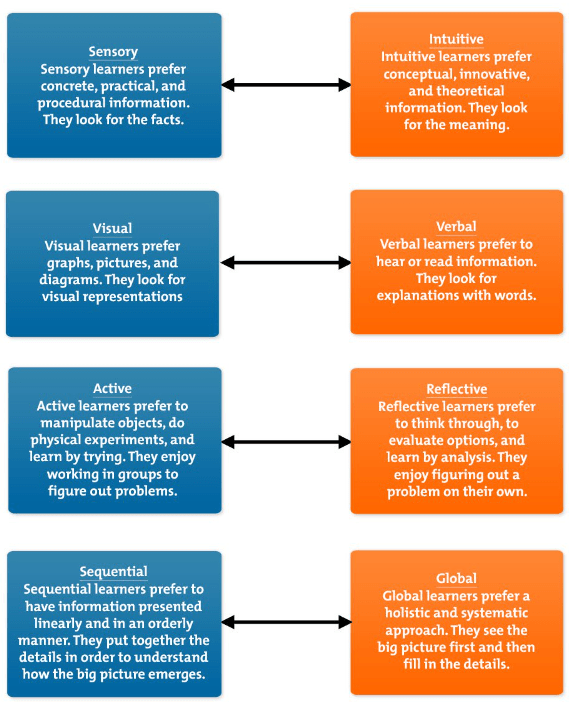On the Ethos3 blog, we’ve been digging into how we learn in an effort to produce presentations with greater content diversity that appeals to the wide range of learning styles in our audiences. Check out our posts on the classic learning theory and on Silver’s 4 styles if you missed them.
Today we’ll look at The Index of Learning Styles developed by Richard M. Felder and Linda K. Silverman with later work by Barbara A. Solomon. This is a combination of 4 sets of traits which are connected to how we take in and process information: active/reflexive, sensing/intuitive, visual/verbal, and sequential/global. The four styles in ILS are not either/or categories. They function along spectrums. So a learner is not either verbal or visual. A learner is verbal or visual to a certain degree.
To increase your understanding of how the ILS functions, take this 40-question assessment to see where you fall. The following graphic will give you an overview of the four categories.

Sensory/Intuitive
Feldman and Soloman say, “Sensing learners tend to like learning facts, whereas intuitive learners often prefer discovering possibilities and relationships.” Presentations with specific, concrete details will appeal to sensory learners while intuitive learners may respond better to presentations with abstractions and theories. Sensors are most comfortable with an up close, real world view of things, while intuitors enjoy the wide-angle shot that encompasses the bigger picture.
Visual/Verbal
Visual learners are more responsive to graphics while verbal learners hone in on words. But Feldman and Solomon say, “Everyone learns more when information is presented both visually and verbally.” Often, presenters don’t use visual communication as much as they should because they simply don’t know how. Consider hiring a skilled designer to help translate your ideas into a powerful narrative that combines imagery and words.
Active/Reflexive
You might recognize an active or reflexive learner by the way he or she approaches something new. Feldman and Soloman say an active learner’s phrase is “Let’s try it out and see how it works” whereas a reflexive learner will prefer to think it through before acting. For example, think about how active or reflexive learners would respond to group discussion. Active learners will probably enjoy it more. So to pull in both learning types, think about putting it later in the presentation when reflexive learners have had time to think. Or give audience members a few minutes to read group discussion questions alone before asking them to move into groups.
Sequential/Global
Learning produces “lightbulb moments” when everything clicks and you reach understanding. This trait combination is about how you best reach that “a-ha!” moment. Some people need a predictable sequence of steps, while others like to jump around in no particular order to reach understanding. Most presenters tend to develop ideas in a sequential format which is great. But it’s important to also address how the steps relate to the bigger concept so global learners don’t get lost or bored among the minutia.
Why Study Learning Styles?
We study learning styles for two primary reasons. The first is to achieve greater self-awareness. Knowing your learning style allows you to understand why some learning situations might be more challenging for you. However, the ILS and theories like it are not meant to create a hedge of self-assessment where learners become inflexible to adapt to other styles. In fact, Felder and Solomon say, ” To be effective as a learner and problem solver, you need to be able to function both ways” in each of the spectrums.
The second goal of using learning styles is to foster better content development and teaching diversity. When we present, we have to remember all of the different ways people learn. This should inspire us to greater creativity in how we develop and present information.
Ethos3 exists to help you create stunning visuals and powerful narratives. See how today.